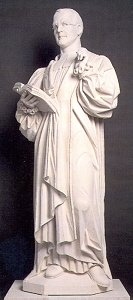Born in 1906, Dietrich Bonhoeffer was the son of a prominent professor of psychiatry and neurology in Berlin. The younger Bonhoeffer studied theology at Tübingen and Berlin, though he was later influenced deeply by Karl Barth. After his ordination, he worked in Barcelona and at the Union Theological Seminary in New York City, returning to a university lectureship and pastoral work in Berlin in 1931. Opposed to the Nazi movement from the first, he sided with the Confessing Church against the so-called German Christians, and he signed the Barmen Declaration in 1934. After serving as chaplain to a Lutheran congregation in London, he returned to Germany in 1935 to become the head of a Confessing Church seminary at Finkenwalde in Pomerania. It was here that he put into practice ideas he had learned in England at the seminary communities at Kelham and Mirfield. He was forbidden by the Nazi government to teach and was dismissed from his lectureship in Berlin in 1936. In 1937 the seminary at Finkenwalde was closed by the government (stimulating Bonhoeffer to write his treatise on Christian fellowship, Life Together). On the cusp of the outbreak of the Second World War Bonhoeffer was in America on a lecture tour, but he felt it his duty to return to Germany despite Reinhold Neibuhr’s urging him to remain in the United States.
His defiant opposition to the Nazi regime (including attempts at mediating between Germans opposed to Hitler and the British government, and his joining a number of high-ranking military officers in a plan to assassinate Hitler) led to his arrest in 1943. After imprisonment in Buchenwald he was hanged by the Gestapo at Flossenbürg on the morning of April 9, 1945.
In Celebrating the Saints, Robert Atwell writes that Bonhoeffer’s experiences “led him to propose a more radical theology in his later works, which have been influential among post-war theologians”. He is in particular considered a forerunner of the “death of God” movement in 1960s liberal Protestant theology. However, this is to read one of his best-known works, a collection of his Letters and Papers from Prison, out of the context of his surroundings and other writings. As a radical theologian (which Bonhoeffer arguably was), he is by his misinterpreters not thought of as one who gets to the root of the matter, as the word implies, but as an iconoclast. “Yet he was and remained a Lutheran and a very orthodox clergyman. His last act before he died was to conduct a religious service” (from the “Translator’s Preface” to Christ the Center, © 1960 Harper San Francisco). As is clear from Christ the Center, a reconstruction of Bonhoeffer’s lectures from his student’s notes, christology – and a robustly orthodox christology at that – lay at the center of Bonhoeffer’s theology. After his experiences of a German Church that lay prostrate and compliant before the pagan and destructive idolatry of Naziism, Bonhoeffer sought a radical reform of the Church, which in its existing form he thought to have no message for his time. In its place he sought a Christianity capable of dispensing with religion (understood in a Barthian sense) and with the cheap grace of religious transactions as a prerequisite of authentic biblical faith.
prepared from The Oxford Dictionary of the Christian Church
and other sources
The Collect
Gracious God, the Beyond in the midst of our life, you gave grace to your servant Dietrich Bonhoeffer to know and to teach the truth as it is in Jesus Christ, and to bear the cost of following him; Grant that we, strengthened by his teaching and example, may receive your word and embrace its call with an undivided heart; through Jesus Christ our Savior, who lives and reigns with you and the Holy Spirit, one God, for ever and ever. Amen.
_______________________________________________________
The photograph is of the statue of Dietrich Bonhoeffer on the western wall of Westminster Abbey, one of the series of twentieth-century martyrs commemorated there.

